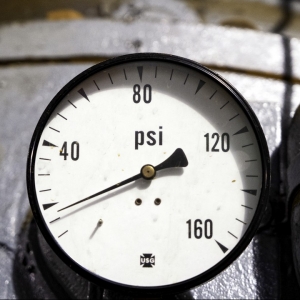This is Eileen Wray-McCann for Circle of Blue. And this is What’s Up with Water, your “need-to-know news” of the world’s water, made possible by support from people like you.
In the southern United States, Hurricane Delta came ashore in Cameron Parish on October 9, striking the Louisiana coast at nearly the same spot as Hurricane Laura did in August. Delta made landfall as a Category 2 storm. Its wind gusts and storm surge crippled areas that have barely recovered from damage incurred ten weeks ago. The Louisiana Department of Health reports that as of Sunday, 71 water systems were partially or fully inoperable. Over seventy percent of those systems were also damaged by Hurricane Laura.
The Japanese fishing industry is objecting to a government proposal to release radioactive water into the sea, according to Reuters news service. The contaminated water is stored in tanks at the Fukushima nuclear plant that was damaged by an earthquake and tsunami in 2011. Fishing groups say that dumping the water into the ocean would tarnish the industry’s reputation and depress fish sales. Tokyo Electric is the power company that operated the closed nuclear plant, and it has collected more than a million tons of water in its holding tanks. The company says it will run out of room to store the water in two year’s time. Japan’s economic minister said a decision on the contaminated water needs to be made soon, but he offered no timeline.
Teachers in Zimbabwe are refusing to go to work, citing a lack of clean water and sanitizer in schools. The Guardian reports that the teachers point to the government’s inability to contain possible coronavirus outbreaks, which keeps them away from their classrooms for the time being. According to the Progressive Teachers’ Union of Zimbabwe, 98 percent of teachers across the country were absent when schools reopened in the last week of September. The teachers are calling for certain conditions before they will return to class, including regular testing, personal protective equipment, and pay increases. Education ministry officials have acknowledged the lack of clean water in schools and they say they are working to reduce overcrowded conditions.
This week Circle of Blue reports on a call for the U.S. Centers for Disease Control and Prevention to use the Public Health Service Act to further respond to the coronovirus pandemic.
Two Democrats on the House Committee on Oversight and Reform asked the CDC to suspend water service disconnections nationwide as a way to slow the spread of Covid-19. Representatives Harley Rouda of California and Rashida Tlaib of Michigan want the federal government’s top public health agency to use its authority under the Public Health Service Act. To protect public health, they want the CDC to prohibit water utilities from shutting off service to customers who are behind on their bills.
The two representatives made their case in an October 5 letter to Robert Redfield, the CDC director. In the letter, they referenced the CDC’s September 4 order to halt most residential evictions through the end of the year. In that decision, the CDC determined that keeping people sheltered, even if they are behind on rent, could be useful in fighting the coronavirus.
Enabling access to water follows similar logic. Because soap and water break apart the new coronavirus, frequent handwashing is one of the CDC’s top recommendations for protection against Covid-19. In interviews, Redfield has reiterated the importance of handwashing.
Many governors and state regulators, noting the importance of water access at home, banned water shutoffs in the first months of the pandemic. Most utilities followed suit, suspending late fees and avoiding shutoffs. States like Michigan ordered water service to be restored to homes that had been disconnected. But now, in the seventh month of the pandemic, many of those protections have expired. Customer debt to utilities has soared, putting more people at risk of having their water shut off.
The Public Health Service Act was passed by Congress in 1944. It gives the Department of Health and Human Services — the parent organization to the CDC — broad authority to prevent the spread of infectious disease. The act authorizes the CDC to issue rules to that end. The CDC overhauled its regulations during the Obama administration, and they went into effect in January of 2017.
James Hodge is a law professor at Arizona State University and director of the Center for Public Health Law and Policy. He told Circle of Blue “Covid has been the first real test of utilizing those powers. We’re seeing some rather broad extensions of what CDC feels is within its capacity.”
The CDC’s eviction ban is a prime example. It applies to people earning less than $99,000 a year. It’s a fairly novel use of a federal provision, according to Lance Gable, an associate law professor at Wayne State University Law School. He said that he’s not aware of similar CDC orders to guard public health. Traditionally, the CDC exercised its power under the Public Health Service Act by imposing quarantines and screening people at border crossings. This January, the agency ordered health screenings for air passengers arriving in the U.S. from Wuhan, where the virus originated.
The CDC’s scope of influence in preventing the spread of disease under the Public Health Service Act is a matter of degrees. The eviction order was a step beyond the typical responses. Professor Hodge said that if the CDC were to issue a moratorium on water shutoffs, it would be consistent with the agency’s decision to suspend evictions.
Water industry groups say that a shutoff moratorium would be problematic for several reasons. Tracy Mehan is executive director of government affairs for the American Water Works Association. He said that national emergencies, such as the pandemic, can sometimes extend for years, making it a challenge to define the boundaries of a moratorium.
Utilities also need revenue to operate, and Congress has not offered any direct financial aid to the water sector in its coronavirus relief packages. Mike Keegan of the National Rural Water Association told Circle of Blue that a shutoff moratorium without financial support for utility operations is an incomplete fix.
The CDC press office did not respond to questions before deadline about whether the agency has considered a water shutoff moratorium. The real question, said Professor Hodge, is it legal for the CDC to ban water shutoffs based on the Public Health Services Act? “Do the CDC’s broader powers to control communicable diseases extend to these types of interventions?”
The CDC eviction order was challenged in court almost immediately. Days after it was issued this September, individual landlords and the National Apartment Association
filed a lawsuit in the U.S. District Court for the Northern District of Georgia. The lawsuit argues that the eviction order oversteps the CDC’s authority.
Hodge said that the eviction lawsuit should be watched closely. The ruling could determine how far the CDC’s authority extends in matters of public health and whether a water shutoff moratorium would have legal grounding. He said “Is this actually what CDC can use its public health powers to limit? It’s already at stake in the existing litigation. Depending on the outcomes of the case, it may greatly dictate what would be possible here.”
And that’s What’s Up With Water from Circle of Blue, which relies on your support for independent water news and analysis. Please visit
circleofblue.org and make a difference through your tax-deductible donation.




